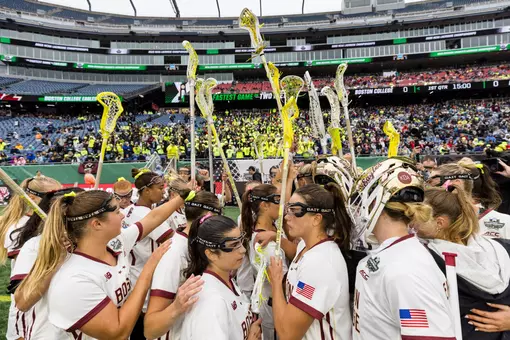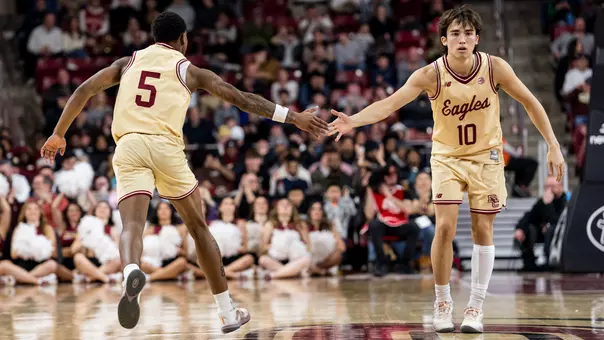Boston College Athletics

A New Situation To Find New Heights
August 17, 2020 | Football, #ForBoston Files
BC finally installed third down and red zone plays this week.
Football's preseason always turns a little bit stale by the time it rolls into its second week. Teams developing repetitive habits end the initial excitement of those first padded practices, and weekly, mundane routines of drills and practices, film sessions and workouts are the norm. Inevitable fatigue sets in, even though players are forming the embryonic definitions of game shape conditions.
Those dog days can bite chunks out of a football team, but the Fish Field House last week lacked all semblance of a letdown. Too much work existed, duties that anchored the Boston College team through a week of turbulence. News and rumors swirled around the future of the 2020 football season, but Boston College's focus remained laser focused as it finally installed missing pieces from its earlier, March opportunity.
"We're finally getting third down and red zone in," head coach Jeff Hafley said, "and we got some short yardage in. That's what we couldn't do in the spring. I'm feeling good about first and second down, where the players are at, and we're starting to introduce third down, third and long. We had some high red zone (on Friday), and we're doing some low red zone (later), but we're working away to get everything installed. The guys are doing a really good job, and we're moving forward pretty well."
It was a welcome change for the Eagles, who only introduced overall schematic concepts before spring practice abruptly shut down. The team never touched its situational football, instead forcing it into a more virtual forum when the players and coaches scattered in the rush to get home. Coaches and players instead talked about everything through Zoom-based meetings, but the athletes themselves had to practice at home with siblings or close friends while varying degrees of quarantine hung over their hometowns and states.
Nothing topped the feeling this past week when they finally lined up for those situations against real, football-based reactions. Intrasquad drills enabled quarterbacks to look for certain reads and audibles, and defenses forced mistakes on the fly by disguising their own abilities. By week's end, the reintroduction brought a sorely missed competition element back to BC, which in turn eluded any expected letdown with its freshness.
"The biggest thing is that we've been able to install the offense," quarterback Dennis Grosel said. "We had talked about it on paper and on film, but getting out there and seeing a (live) defense is different. You know the first read could be in the back of the end zone, but the way a defense plays it could make (the play execution) different. You're not just throwing to your brother in the backyard; it's a little different."
It's a work that's finally displaying progress for Hafley and offensive coordinator Frank Cignetti, Jr. The duo arrived at Boston College with an acute awareness of the program's foundation, and they internally stated their intention to enhance the team's entrenched reputation by simply building on what's always made the Eagles a tough program.
Since 2000, the Eagles' offensive picture preached consistency. The team only averaged more than 30 points during three seasons, one of which occurred in 2018 and the other two of which happened before the team realigned out of the Big East. Conversely, the team also never lacked points and only produced four seasons where the offense averaged less than 20 points per game.
Those seasons all pointed towards a unique production and impact. BC qualified for bowl games every time the offense produced 20 points per game. Its lower offensive production produced seasons without the postseason game with one exception, when the team averaged less than 20 points allowed per game in 2010.
A one-score standard deviation from the team's 20/20 model produced vastly different results. Each of BC's nine-win or 10-win seasons featured an offense that scored between 24-30 points and a defense allowing anywhere from 15-20 points per game. That's the difference of an extra field goal or touchdown on offense while preventing one touchdown or field goal more than what it allowed.
Finding the difference in those numbers is normally found in situational football, or plays where an offense can convert on third down or short yardage while converting red zone opportunities. That means BC has a formula already in place that's produced success over the past 20 years and is now only looking to build on that by finding the next level through its new coaching staff.
"We don't want to lose the physicality of power football," Cignetti said, "but we want to be wide open and put guys in a position to be successful. You look at your players and think players first, not plays. You design touches for them, whether it's in the running game or passing game. When you look at perimeter players, and I include tight ends and running backs (in that group), we have to build a system where they make plays."
"Just watching (receivers) and being around Coach Cignetti and those guys, they have a great system that I think is easy to learn," Hafley said. "It looks complicated to the outside eye, but it's easy."
That's where BC's continued growth through the dog days of camp turns into an opportunity. The Eagles know their offensive line and power running game is intact, even without AJ Dillon in uniform, but their current objective is more about augmenting the explosive plays and diversified routes to find its next tier. It's a new degree of difficulty, even as it delivers a freshness to the days when hitting teammates can grow old.
"Coach Cignetti has a good way of moving pieces around," Grosel said. "There could be five guys running the same route in five different ways. It's easy on us in terms of the offense, but I've been working hard with receivers and tight ends because it's more difficult to know how to line up."
"Third down, in my opinion, is a completely different game," Hafley said. "On third down, you have different pressures, different coverages, and different looks and disguises. Just like anything else, you teach it in the room, you drill it, you walk through it, you do it full speed, you make a mistake, you watch it, you do it again, and it gets better. That's the whole process. First and second down, and third down, are two completely different games and have to be coached like that."
Those dog days can bite chunks out of a football team, but the Fish Field House last week lacked all semblance of a letdown. Too much work existed, duties that anchored the Boston College team through a week of turbulence. News and rumors swirled around the future of the 2020 football season, but Boston College's focus remained laser focused as it finally installed missing pieces from its earlier, March opportunity.
"We're finally getting third down and red zone in," head coach Jeff Hafley said, "and we got some short yardage in. That's what we couldn't do in the spring. I'm feeling good about first and second down, where the players are at, and we're starting to introduce third down, third and long. We had some high red zone (on Friday), and we're doing some low red zone (later), but we're working away to get everything installed. The guys are doing a really good job, and we're moving forward pretty well."
It was a welcome change for the Eagles, who only introduced overall schematic concepts before spring practice abruptly shut down. The team never touched its situational football, instead forcing it into a more virtual forum when the players and coaches scattered in the rush to get home. Coaches and players instead talked about everything through Zoom-based meetings, but the athletes themselves had to practice at home with siblings or close friends while varying degrees of quarantine hung over their hometowns and states.
Nothing topped the feeling this past week when they finally lined up for those situations against real, football-based reactions. Intrasquad drills enabled quarterbacks to look for certain reads and audibles, and defenses forced mistakes on the fly by disguising their own abilities. By week's end, the reintroduction brought a sorely missed competition element back to BC, which in turn eluded any expected letdown with its freshness.
"The biggest thing is that we've been able to install the offense," quarterback Dennis Grosel said. "We had talked about it on paper and on film, but getting out there and seeing a (live) defense is different. You know the first read could be in the back of the end zone, but the way a defense plays it could make (the play execution) different. You're not just throwing to your brother in the backyard; it's a little different."
It's a work that's finally displaying progress for Hafley and offensive coordinator Frank Cignetti, Jr. The duo arrived at Boston College with an acute awareness of the program's foundation, and they internally stated their intention to enhance the team's entrenched reputation by simply building on what's always made the Eagles a tough program.
Since 2000, the Eagles' offensive picture preached consistency. The team only averaged more than 30 points during three seasons, one of which occurred in 2018 and the other two of which happened before the team realigned out of the Big East. Conversely, the team also never lacked points and only produced four seasons where the offense averaged less than 20 points per game.
Those seasons all pointed towards a unique production and impact. BC qualified for bowl games every time the offense produced 20 points per game. Its lower offensive production produced seasons without the postseason game with one exception, when the team averaged less than 20 points allowed per game in 2010.
A one-score standard deviation from the team's 20/20 model produced vastly different results. Each of BC's nine-win or 10-win seasons featured an offense that scored between 24-30 points and a defense allowing anywhere from 15-20 points per game. That's the difference of an extra field goal or touchdown on offense while preventing one touchdown or field goal more than what it allowed.
Finding the difference in those numbers is normally found in situational football, or plays where an offense can convert on third down or short yardage while converting red zone opportunities. That means BC has a formula already in place that's produced success over the past 20 years and is now only looking to build on that by finding the next level through its new coaching staff.
"We don't want to lose the physicality of power football," Cignetti said, "but we want to be wide open and put guys in a position to be successful. You look at your players and think players first, not plays. You design touches for them, whether it's in the running game or passing game. When you look at perimeter players, and I include tight ends and running backs (in that group), we have to build a system where they make plays."
"Just watching (receivers) and being around Coach Cignetti and those guys, they have a great system that I think is easy to learn," Hafley said. "It looks complicated to the outside eye, but it's easy."
That's where BC's continued growth through the dog days of camp turns into an opportunity. The Eagles know their offensive line and power running game is intact, even without AJ Dillon in uniform, but their current objective is more about augmenting the explosive plays and diversified routes to find its next tier. It's a new degree of difficulty, even as it delivers a freshness to the days when hitting teammates can grow old.
"Coach Cignetti has a good way of moving pieces around," Grosel said. "There could be five guys running the same route in five different ways. It's easy on us in terms of the offense, but I've been working hard with receivers and tight ends because it's more difficult to know how to line up."
"Third down, in my opinion, is a completely different game," Hafley said. "On third down, you have different pressures, different coverages, and different looks and disguises. Just like anything else, you teach it in the room, you drill it, you walk through it, you do it full speed, you make a mistake, you watch it, you do it again, and it gets better. That's the whole process. First and second down, and third down, are two completely different games and have to be coached like that."
Players Mentioned
The Podcast For Boston Baseball Edition
Friday, February 13
Women's Basketball: Florida State Postgame Press Conference (Feb. 12, 2026)
Friday, February 13
Women's Hockey: Mic'd Up with Alanna Devlin
Thursday, February 12
Heights Hockey Rewind | The Beanpot
Thursday, February 12




















